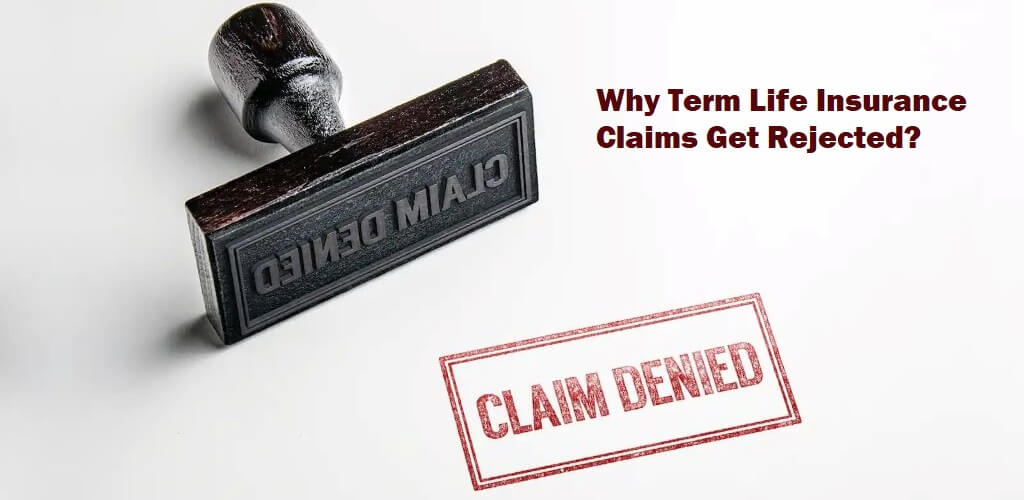Rejecting claims is inevitable, even if the majority of term insurance providers highlight an efficient and clear claim settlement procedure. While the insurance company may be at fault in certain situations, policyholder ignorance or carelessness is typically the reason for the claim’s rejection. The nominee may not get the full amount of the claim if the claim is not settled after it is filed. If there is any disparity, the insurance provider has the right to deny the claim and provide a rationale for the denial.
What is Term Insurance?
Understanding the components of a term insurance plan is necessary to understand the reasons behind term insurance claim rejections.
Term insurance is a type of insurance where you have to pay the insurance company premiums. For the duration of the specified “term,” these premium payments are made. This policy is therefore held for a predetermined time (period) and has a predetermined maturity date.
A payout is made to the authorized nominee in the policy to be distributed to the beneficiaries specified in the policy document if the policyholder dies within the policy’s active term.
Can a Term Insurance Claim Be Turned Down?
A term plan is subject to particular terms and conditions, which define what is and is not covered, just like any other insurance policy. When a claim is made for an occurrence that is specifically mentioned in the policy’s “Exclusions” section, it is frequently rejected for term insurance plans.
The term insurance claim is denied because none of the events listed in this section are covered by the policy. The following situations are specifically not covered by term life insurance:
- The policyholder’s passing was due to injuries or pre-existing medical issues that were not disclosed.
- In the event of the policyholder’s passing, whether directly or indirectly through the nominee.
- Drug or alcohol use was a factor in the policyholder’s death.
- The policyholder’s passing was a result of engaging in risky hobbies like racing and paragliding, among others.
- The policyholder’s death was a result of delivery-related problems when the pregnancy was concealed.
Top Reasons for Rejection of Term Insurance Claims
Listed below are the reasons for the rejection of the term insurance claims.
- Inaccurate data on the application form
The policy beneficiary must ensure that all the information on the claim form is filled out accurately. Any false information could work against you in a term insurance claim. The nominee must carefully fill out all relevant fields, including those related to income, age, occupation, lifestyle (drinking and smoking), qualification, facts about prior insurance policies, claims history, and other pertinent information. Additionally, the information should be double-checked by the beneficiary before being sent to the insurance provider.
- Not Providing Medical History Details
Both online and offline term insurance purchases require you to submit information about your medical background. If you have had surgery or have any underlying medical conditions, you need to let your insurance company know. You must also provide information about your family’s medical history, including whether or not your parents have diabetes or high blood pressure. Based on these particulars, they will calculate the amount of your premium.
Let’s say you don’t disclose your pre-existing cardiac issue when you buy your term plan. You can have a deadly heart attack during the policy term. The insurance company will look into a claim made by your nominee. When they find out that you didn’t reveal your pre-existing cardiac ailment, they will reject your claim and deprive your family of the money.
- Forgetting to Update Nominee Information
Your nominee is the beneficiary of the insurance payout if you pass away during the policy’s term. You have to update your nominee data to guarantee a hassle-free and seamless payment process. Your parent could be the person you wish to nominate while you’re young. You need to update your nominee if they experience any changes. It is also your responsibility to confirm that the nominee’s contact data and address are accurate. The claim may be denied by the insurance company if there is a mistake and they are unable to get in touch with the nominee.
- Undisclosed lifestyle choices
When purchasing term insurance, one must give to the insurer any information about one’s lifestyle choices, including drinking, smoking, and overindulging in food. Moreover, before applying for a term plan, an applicant must disclose to the insurer any inclination toward extreme sports like deep-sea diving or paragliding. This will make it easier for the insurance provider to assess the policyholder’s case.
- Failure to Disclose Existing or Previous Plans
You have to let your insurer know whether you have any other term policies in your name when you buy a term plan. These additional plans are taken into account by insurance firms when they perform financial underwriting.
Your insurance provider has the right to cancel your current plan or deny any further claims if you fail to declare an existing policy.
- Lapse in Policy
You need to have a current insurance policy to be qualified for claims. The policy could become void if you don’t pay the premium.
The untimely lapse of a policy owing to nonpayment of premiums is one of the most frequent grounds for rejection of term insurance policies. For your convenience, most insurers offer a grace period that allows you to pay your premium even if you miss the deadline.
To reinstate your term insurance policy, you might have to pay the required fees if you neglect to make payments during this time.
Best Ways To Avoid Term Insurance Claim Rejection
Listed below are the ways to avoid term insurance claim rejection.
- Never withhold or omit information
Make sure to include all necessary information when filling out the application. The insurance provider must have complete knowledge of you. Prevent inadvertently leaving out or forgetting facts. The insurance premium is set according to important information, such as your age, occupation, number of policies you own, health, lifestyle, and so forth. Some people lie to reduce the amount of the premium, but they end up with problems afterward. Their allegation might be rejected. The dependants lose out on the insurance benefits when a claim is denied. Additionally, it happens that you might accidentally provide false information or that the business entered incorrect information. Therefore, you must perform a thorough check after you receive the policy documents to eliminate any errors—both on the part of the insurance provider and yourself.
- Pay your premiums on time
Only plans that are still in effect will have claims settled by insurers. Remarkably many consumers are unaware that their plans lapse when they fail to make premium payments on time. You are not covered when your policy lapses and all of the premiums you have already paid will be lost. You will not receive your premiums back, nor will they have any legal standing to guarantee that the firm would pay your death benefit or sum assured to you or your dependents.
Penalties and reinstatement fees may also apply in certain situations if you miss payments. Additionally, when it comes time for a settlement, the insurer will have one less thing to argue over if you have a spotless record of paying premiums.
- Don’t delay in filing insurance claims
In an emergency, calling your insurance provider might be the last thing on your mind, but it could mean the difference between having insurance coverage and not. Giving your emergency insurance information to a reliable friend, coworker, or relative can help if you are unable to notify the insurance company on your own. In other words, the life insurance company must be informed of any future events for which they may be held financially accountable. The quicker you notify the firm of any incident requiring medical treatment, the simpler it will be to file your claim. Insurance companies also view hospitalization notification delays as red flags for possible fraud. Giving prompt notice can also help you avoid being accused of this.
- Thoroughly scrutinize the policy document
The policy document’s main purpose is to absolve the business of any potential financial and legal obligations that might result from entering into a contract with you. Goodbye to any hopes of getting any form of compensation from the insurance company if you get sick, die at random, or need to file an insurance claim for any of the reasons listed in the “exceptions” section. Throughout your insurance agreement are clauses like the exceptions list that release the insurer from any duty to you. It is crucial that you carefully read over your policy statement to make sure that none of the sections specified are possible. And if they are, you and your insurer can probably renegotiate the terms of your coverage.
- Complete the application for insurance on your own
Don’t put your trust in that impeccably groomed, always smiling, and question-avoidant insurance agent to fill out your documents. Based on the information you provide on your applications, insurers determine your premium payment amount, total coverage, and even some exclusions. The insurance agent will not be able to comprehend and explain on the form the more complex nuances of your medical history if you only tell him everything about it. It will require you to set aside some time during the day to organize your data and accurately complete all the information on the forms on your own.
Final Words
Before deciding on a plan, it is crucial to review the insurance companies’ claim settlement ratio to prevent the case of a claim being rejected. Thus, by remembering the aforementioned information, one may guarantee that they receive all of the policy’s benefits as scheduled in addition to protecting their loved one’s future.








